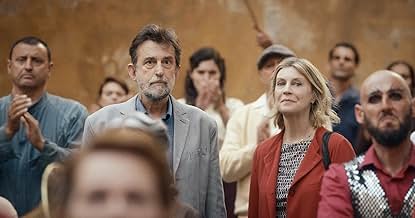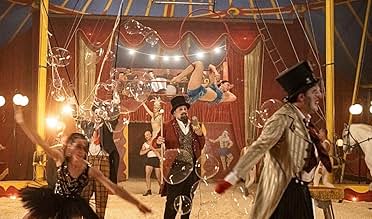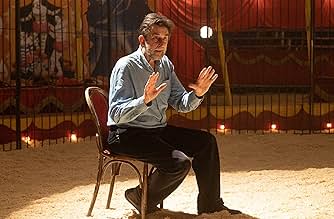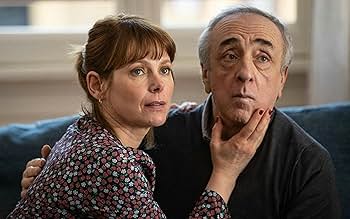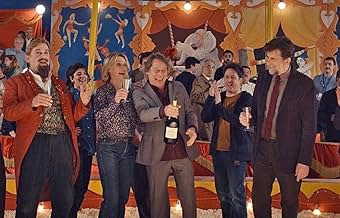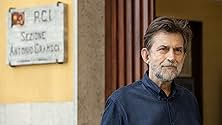VALUTAZIONE IMDb
6,7/10
3828
LA TUA VALUTAZIONE
Giovanni dirige tra mille incertezze un film sulla vita di un intellettuale comunista nel fatidico 1956, l'anno dell'invasione sovietica dell'Ungheria. Nel frattempo il suo matrimonio va in ... Leggi tuttoGiovanni dirige tra mille incertezze un film sulla vita di un intellettuale comunista nel fatidico 1956, l'anno dell'invasione sovietica dell'Ungheria. Nel frattempo il suo matrimonio va in crisi.Giovanni dirige tra mille incertezze un film sulla vita di un intellettuale comunista nel fatidico 1956, l'anno dell'invasione sovietica dell'Ungheria. Nel frattempo il suo matrimonio va in crisi.
- Regia
- Sceneggiatura
- Star
- Premi
- 2 vittorie e 21 candidature totali
Recensioni in evidenza
Someone asked me one day which person in history I would want to have lunch with. While Julius Caesar, Jesus Christ, Napoleon or George Washington may have been good candidates, I couldn't think of a name that appealed more to me than Nanni Moretti. Over the last 25 years, starting with the exceptional Palombella Rossa, Nanni Moretti has had an uninterrupted streak of masterpieces including Caro Diario, The Son's Room, The Caiman, We Have a Pope, Mia Madre and Three Floors, to name a few, which rank among the best films made in that time period, and make Nanni Moretti one of the greatest living filmmakers.
With that track record, I imagine Moretti could only disappoint. And disappoint he does with A Brighter Tomorrow. Don't get me wrong, we are still talking about one of the best filmmakers in the world, one that certainly knows how to make a good movie. But this one feels miles behind his other films. One of the things that hit you is how self-referential it is. From the name of the circus in the film (Budavari, a reference to Palombella Rossa) to the obsession with shoes (a reference to his earlier films, in particular Bianca) to a scene playing with a soccer ball (a reference to Caro Diario), it feels reheated, almost vain, from a filmmaker who always looked decidedly into the future. And this feeling of lack of ideas is made worse by abundant references to classic films, in particular those of Fellini.
In a way, these shortcomings arise from the subject of the film itself: it is ultimately about the gap between Moretti's values, represented by his films and his film culture, and today's world. But the issue is the message feels conveyed without passion, which has been the one constant in his filmography to this day. A Brighter Tomorrow therefore disappoints. We can only hope for Moretti's next film and remember all of his previous ones.
With that track record, I imagine Moretti could only disappoint. And disappoint he does with A Brighter Tomorrow. Don't get me wrong, we are still talking about one of the best filmmakers in the world, one that certainly knows how to make a good movie. But this one feels miles behind his other films. One of the things that hit you is how self-referential it is. From the name of the circus in the film (Budavari, a reference to Palombella Rossa) to the obsession with shoes (a reference to his earlier films, in particular Bianca) to a scene playing with a soccer ball (a reference to Caro Diario), it feels reheated, almost vain, from a filmmaker who always looked decidedly into the future. And this feeling of lack of ideas is made worse by abundant references to classic films, in particular those of Fellini.
In a way, these shortcomings arise from the subject of the film itself: it is ultimately about the gap between Moretti's values, represented by his films and his film culture, and today's world. But the issue is the message feels conveyed without passion, which has been the one constant in his filmography to this day. A Brighter Tomorrow therefore disappoints. We can only hope for Moretti's next film and remember all of his previous ones.
I didn't like this movie at all. Perhaps this was a movie for die hard Moretti fans that saw all his movies? For me the story was very weak, the pace was utterly slow and clearly they should prohibit certain directors to act in their own movies. There were some nice shots and sure I could smile a few times. I guess a metafilm can work, but I couldn't relate to neither one of the stories and both of the stories were quite superficial and unexciting. In short: I agree with the reviewer of the gardian who writes: "I'm sure the future will be brightened by another, better Moretti film - this one is best forgotten."
I found this film very enjoyable and funny. Of course it's not the first film about a director making a film, and I had only seen two of his films before so I can't tell to what extent this is "always the same Moretti stuff", but to me this film seemed rather unique and original. Nanni Moretti himself (called Giovanni in the film) is the main protagonist here, and he is mightily annoying, talking endlessly without listening properly to others including his wife, with a voice that reveals a clear sense for his own importance. This is however obviously ironic and self-deprecating (the Guardian reviewer, who slaughtered this film, apparently missed that, which is hard to believe but maybe something got lost in translation?) in an often very funny way. It helps to know such people in real life for appreciating his portrayal. Otherwise he is directing a film about Italian communists' reaction to the 1956 Hungarian uprising while the Italian communists host a Hungarian circus in Rome. He also deranges another film in which his wife participates lecturing the director on the "correct" use and non-use of violence in films. Meanwhile his very convincing down-to-earth wife prepares to separate from him (the audience can clearly see why she would want that) with a counsellor as on her own she apparently doesn't manage to take this step on her own. There is some surreal stuff with nods to Fellini and Godard in the film, and apart from Moretti's misbehaviour and the breaking down of his marriage there's some politics, feminism, and thought about cinema back then and now in the film. Moretti's general state resonates well with what goes on it the film he makes and how he directs it. Sometimes there is more than one layer of irony and it is not necessarily easy to get it all, but I for sure got enough out of it. There is a fine line between annoyance and fun in Moretti's ironic self-portrayal, but this came out on the right side for me, just about. Ultimately there is some development in his personality in a somewhat more pleasant direction; he can confess his own uncertainty and vulnerability, but will it last? I wasn't very keen on the end, but also this was ironically broken, which was well needed to make it acceptable for me. The film has its flaws, but I was well entertained, and I raise my hat to Moretti for his self-irony.
A film that's different from the usual, almost a metafilm into which other films are interwoven. Moretti talks to us about history, politics, love, violence, and physical decay. In some ways, it's also very autobiographical. Despite the many themes the director has inserted, everything flows smoothly towards an ending that leaves some threads of hope for the audience. I left the cinema feeling happy, despite everything. For this, I want to thank Moretti. At some point, it wasn't so obvious. The actors' performances were also great, especially those of Silvio Orlando and Margherita Buy, as well as Amalric's. In short, it's the usual Moretti film that never disappoints and I believe can be appreciated not only by an Italian audience but also an international one.
I liked the film as a whole, Moretti is certainly someone who loves cinema and in general all the art of old Italy, you can see everything in the protagonist played and representing himself, but I can't fully understand the intent because I don't know well the real communist ideologies or the Soviet ones or the Italian Communist Party. But I can appreciate the desire to create well-made characters, in a world where cinema is produced only by big houses that do not grasp the essence of art in any way the protagonist lives his life completely in art, in his own art and in the art of others, and when he gets the chance he analyzes art in all the ways it's possible to do it and all he does is bring his art back to the screen, no matter the money, just instinctively as an artist, it's the first film I've seen by this director and consequently I don't know if it's below or above average compared to the others, but I give it a 7 because it's a film that has soul and the desire to tell something.
Lo sapevi?
- QuizSelected to compete for the Palme d'or in the 2023 Cannes Film Festival. This is the ninth time that a film from director Nanni Moretti is selected at Cannes; every movie he made since "Caro diario" has been at Cannes, he even won the Palme d'or in 2001 with "The Son's Room."
- ConnessioniFeatures La dolce vita (1960)
I più visti
Accedi per valutare e creare un elenco di titoli salvati per ottenere consigli personalizzati
- How long is A Brighter Tomorrow?Powered by Alexa
Dettagli
- Data di uscita
- Paesi di origine
- Lingue
- Celebre anche come
- L'ombra scura
- Luoghi delle riprese
- Aziende produttrici
- Vedi altri crediti dell’azienda su IMDbPro
Botteghino
- Budget
- 12.284.110 € (previsto)
- Lordo in tutto il mondo
- 6.668.544 USD
- Tempo di esecuzione1 ora 35 minuti
- Colore
- Proporzioni
- 1.85 : 1
Contribuisci a questa pagina
Suggerisci una modifica o aggiungi i contenuti mancanti

![Guarda Trailer [OV]](https://m.media-amazon.com/images/M/MV5BZjUxOGY3NjUtN2RiNy00NDlkLWE4MGYtZjkxMTU2MmNmOTBmXkEyXkFqcGdeQXRyYW5zY29kZS13b3JrZmxvdw@@._V1_QL75_UX500_CR0)

